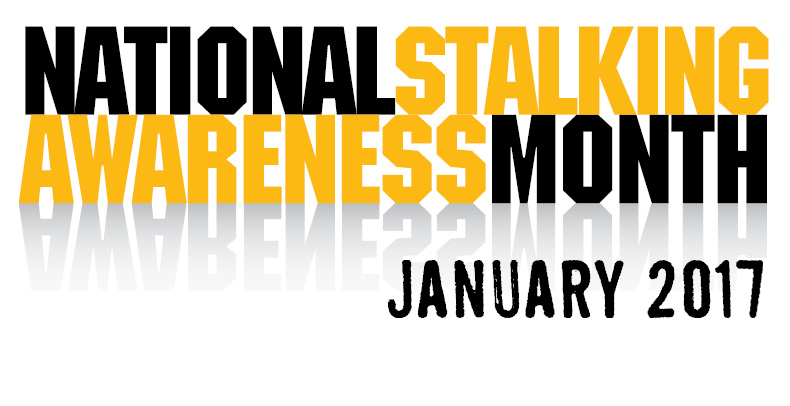January is National Stalking Awareness Month, a time to focus on a crime that affected 7.5 million victims in one year. The theme—“Stalking: Know It. Name It. Stop It.”—challenges the nation to fight this dangerous crime by learning more about it. Stalking is a crime in all 50 states, the U.S. Territories and the District of Columbia, yet many victims and criminal justice professionals underestimate its seriousness and impact.
In one of five cases, stalkers use weapons to harm or threaten victims, and stalking is one of the significant risk factors for femicide (homicide of women) in abusive relationships. Victims suffer anxiety, social dysfunction, and severe depression at much higher rates than the general population, and many lose time from work or have to move as a result of their victimization. Stalking is difficult to recognize, investigate, and prosecute. Unlike other crimes, stalking is not a single, easily identifiable crime but a series of acts, a course of conduct directed at a specific person that would cause that person fear. Stalking may take many forms, such as assaults, threats, vandalism, burglary, or animal abuse, as well as unwanted cards, calls, gifts, or visits. One in four victims reports that the stalker uses technology, such as computers, global positioning system devices, or hidden cameras, to track the victim’s daily activities. Stalkers fit no standard psychological profile, and many stalkers follow their victims from one jurisdiction to another, making it difficult for authorities to investigate and prosecute their crimes.
Communities that understand stalking, however, can support victims and combat the crime. We have a better chance to protect victims and prevent tragedies.” Hyde County Hotline will offer community awareness classes about stalking during the annual observance.
For more information, please contact Hyde County Hotline 252-925-2502
For additional resources to help promote National Stalking Awareness Month, please visit http://stalkingawarenessmonth.org and www.ovw.usdoj.gov.
WHAT IS STALKING?
While legal definitions of stalking vary from one jurisdiction to another, a good working definition of stalking is a course of conduct directed at a specific person that would cause a reasonable person to feel fear.
7.5 million people are stalked in one year in the United States. • 15% of women and 6% of men have experienced stalking victimization at some point during their lifetime in which they felt very fearful or believed that they or someone close to them would be harmed or killed. • The majority of stalking victims are stalked by someone they know: 61% of female victims and 44% of male victims of stalking are stalked by a current or former intimate partner, 25% of female victims and 32% of male victims are stalked by an acquaintance. • About half of all victims of stalking indicated that they were stalked before the age of 25. About 14% of female victims and 16% of male victims experienced stalking between the ages of 11 and 17. • Approaching the victim or showing up in places when the victim didn’t want them to be there; making unwanted telephone calls; leaving the victim unwanted messages (text or voice); and watching or following the victim from a distance, or spying on the victim with a listening device, camera, or global positioning system were the most commonly reported stalker tactics by both female and male victims of stalking. [Matthew J. Breiding et al., “Prevalence and Characteristics of Sexual Violence, Stalking, and Intimate Partner Violence Victimization – National Intimate Partner and Sexual Violence Survey, United States, 2011”, Centers for Disease Control and Prevention Morbidity and Morality Weekly Report, Vol. 63, No. 8 (2014)] • 46% of stalking victims experience at least one unwanted contact per week. • 11% of stalking victims have been stalked for 5 years or more. [Katrina Baum et al., “Stalking Victimization in the United States,” (Washington, DC: Bureau of Justice Statistics, 2009).]
Stalking: Real Fear, Real Crime- Part 1 of 3
Stalking: Real Fear, Real Crime 2/3
Stalking: Real Fear, Real Crime 3/3

